MercoPress. South Atlantic News Agency
Tag: Open, Simultanous and Compulsary Primary elections (PASO)
-
Saturday, October 3rd 2015 - 11:01 UTC
Argentina's incumbent presidential candidate Scioli could just make it in the first round
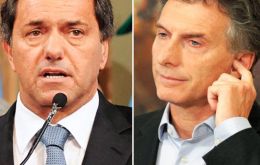
Ruling party candidate Daniel Scioli could win Argentina's presidential election in the first round, after an opinion poll published on Friday showed he had widened his lead over his closest rival. Scioli, the anointed candidate of President Cristina Fernandez, would win 41.3% of voters' support, including his share of projected undecided votes, the survey by Ricardo Rouvier & Associates showed. Second-placed mayor of Buenos Aires City, Mauricio Macri would secure 30.5%.
-
Monday, August 31st 2015 - 07:34 UTC
Argentine opposition agree on reform but not on an electoral alliance

Argentine opposition presidential candidates despite the encouraging mathematics which emerged from early August primaries, and despite having sat at the same table to call for electoral reform, insisted that any ongoing cooperation between the two rival candidates on electoral matters should not be confused with an electoral alliance.
-
Thursday, August 13th 2015 - 07:05 UTC
Rain and floods in Buenos Aires province become a political challenge
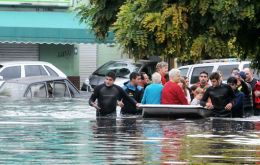
Over 20.000 people are estimated to have been evacuated or suffering flooding because of continued rains in Buenos Aires province where a wind alert for the River Plate area and coastal zones is hampering draining possibilities, a situation which started last week and is expected to last until Sunday.
-
Monday, August 10th 2015 - 07:28 UTC
Argentine primaries added more expectations to October 25 first round vote

The Cristina Fernandez administration candidate Daniel Scioli, as anticipated, was the presidential hopeful with most votes in Argentina Sunday's open, simultaneous and mandatory primaries, (PASO), in which the different parties chose those who will lead them into the 25 October election to elect the head of the Executive, half the Lower House and a third of the Senate.
-
Saturday, August 8th 2015 - 08:30 UTC
Argentine mandatory primaries on Sunday: 32 million entitled to vote

Electoral silence has started ahead of the PASO primary elections (Open Simultaneous, Mandatory Primaries) that will take place on Sunday when Argentines will cast their ballots to choose their candidates to compete in October’s general run, including the successor of president Cristina Fernandez.
-
Thursday, August 6th 2015 - 08:59 UTC
Sunday's vote, Argentina's first step to October's presidential election
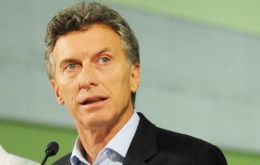
Argentines will be going to the polls this Sunday to vote in the open, simultaneous, mandatory primaries (PASO) when the different parties will be choosing their one-candidate for the big prize on 25 October when the successor of Cristina Fernandez will be elected together with half of the Lower House (129 seats), a third of the Senate (24 seats) and 43 members for the Mercosur parliament.
-
Monday, July 20th 2015 - 05:21 UTC
Macri's party retains Buenos Aires city but his presidential aspiration suffers a significant blow
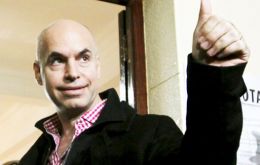
Argentina's conservative PRO party won the Buenos Aires City mayoral runoff on Sunday, clinging to its stronghold for a third consecutive term ahead of presidential elections in October, but by a smaller-than-expected margin. Horacio Rodríguez Larreta won 51.6% of ballots cast while his opponent Martin Lousteau picked up 48.4%. Public opinion polls anticipated a ten points difference.
-
Tuesday, June 23rd 2015 - 05:17 UTC
Falklands-born Alexander Betts candidate for a Mercosur parliament seat
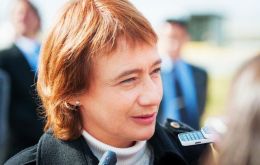
Alejandro Betts, born in the Falklands and now full Argentine citizen will run for office in the Mercosur Parliament, Parlasur, in representation of the Tierra del Fuego province, although he must first overcome the 9 August PASO primaries (open, simultaneous and mandatory), according to reports from the official Argentine news agency, Telam.
-
Friday, May 15th 2015 - 07:06 UTC
Scioli and Randazzo, the two hopefuls competing for Cristina Fernandez legacy
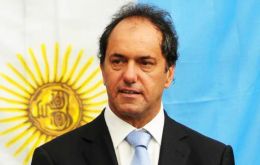
Buenos Aires province governor Daniel Scioli and Interior and Transport Minister Florencio Randazzo will be the only Argentine presidential candidates to compete in the coming August incumbent Victory Front, PASO primaries.
-
Tuesday, April 21st 2015 - 06:59 UTC
Argentine opposition gets most votes in primaries of two main electoral districts

Argentine opposition parties came ahead in the regional primaries for governors held on Sunday in two important electoral districts, Santa Fe and Mendoza. Argentina is holding general elections next October but the law makes mandatory the open, simultaneous and mandatory primaries, PASO, which also help to give an idea of the electoral map and political feeling of public opinion.
